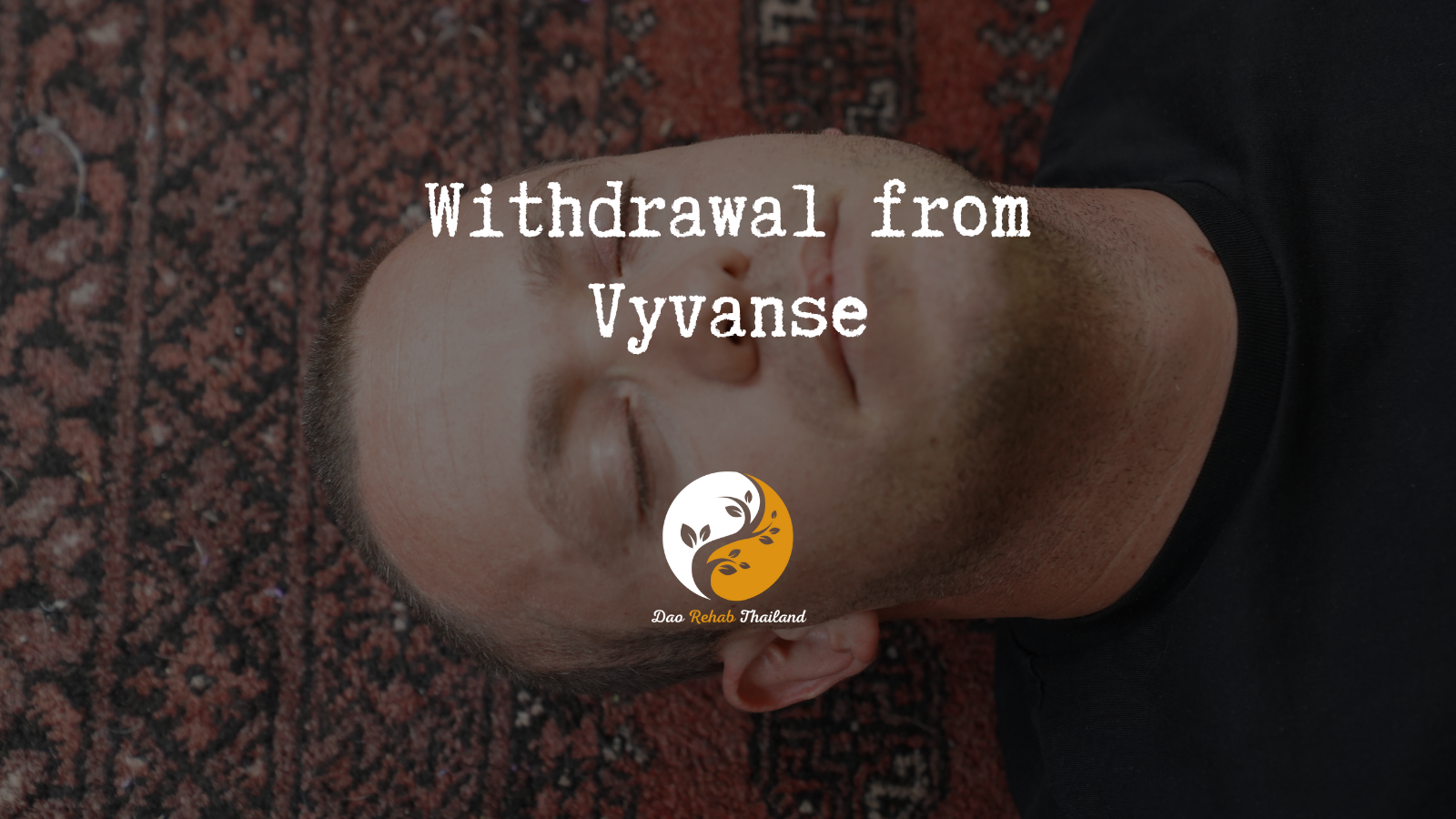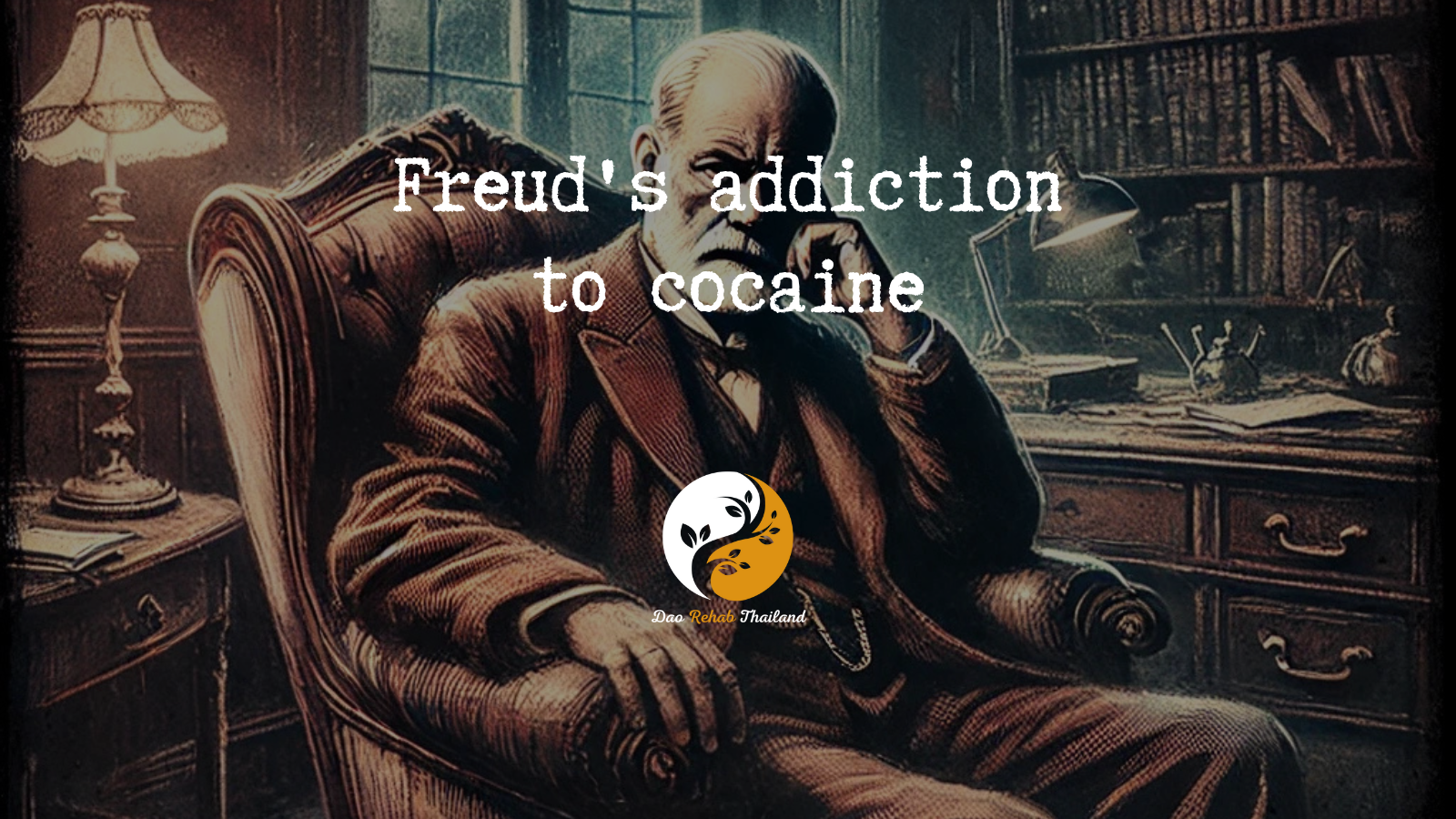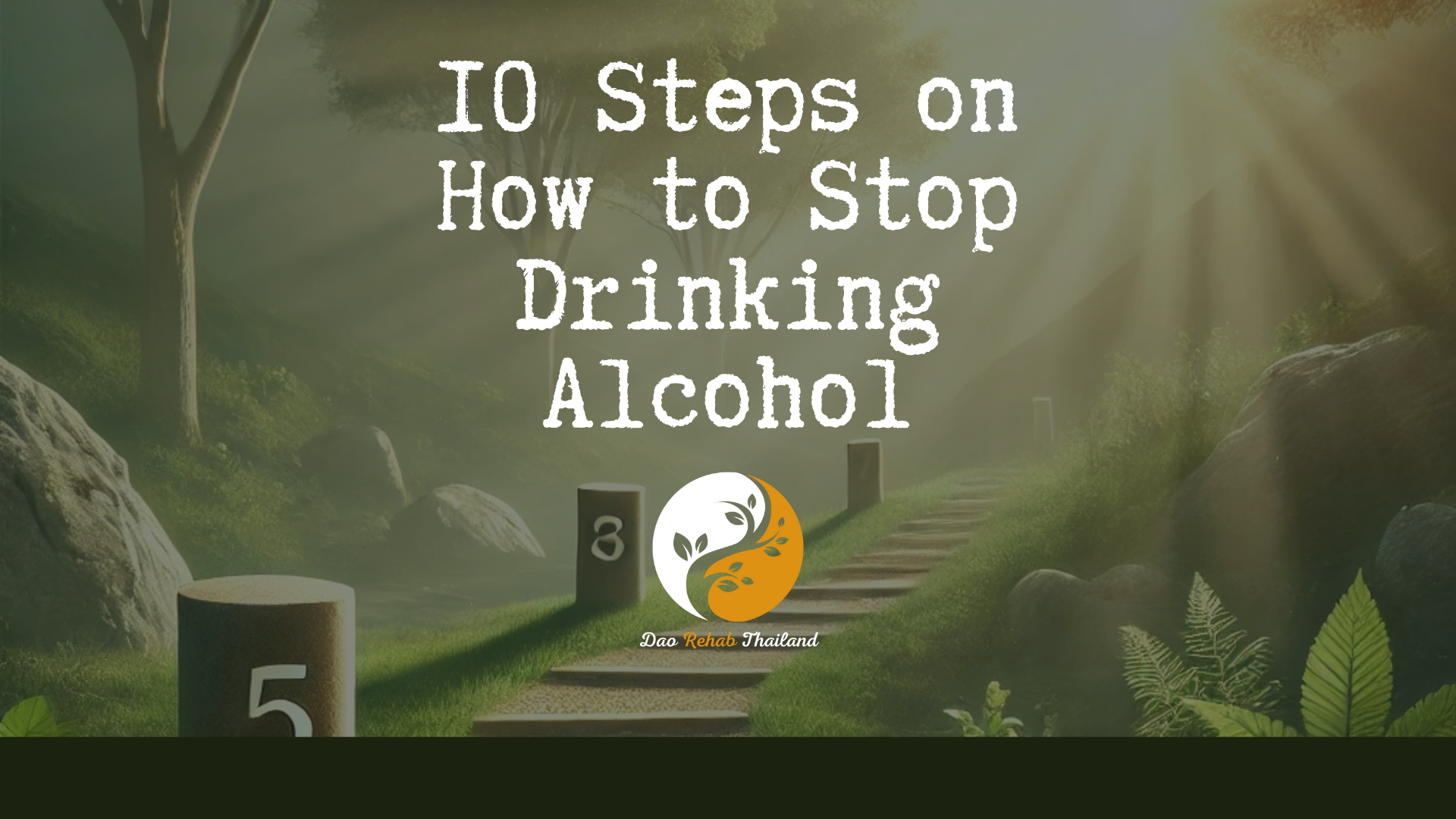
Withdrawal from Vyvanse-Holistic rehab in Thailand
Withdrawal from Vyvanse
“Turning the impossible into possible”

"Detox from Drugs at a Luxury Holistic Center in Thailand and Israel"

Withdrawal from Vyvanse
Development and approval of Vyvanse: The pill Vyvanse, which contains the active ingredient lisdexamfetamine, was developed by the pharmaceutical company Shire. The FDA approved its use for the treatment of ADHD in adults and children in 2007.
As with all ADHD pills, Taotherapy casts a heavy shadow over the diagnosis that there is such a thing as ADHD, a diagnosis that has come to serve the prescription drug companies to drug the next generation and enrich the shareholders of the prescription drug companies.
"Holistic Center for Trauma, Addiction, and Mental Imbalance Treatment in Thailand"
“Come to the beginning of your journey to freedom from addiction to alcohol, drugs, and pills, and rediscover your life within the serene embrace of DaoTherapy Rehab in Thailand—where holistic healing meets empowering recovery.”
DaoTherapy Holistic Rehab
Key Elements of Drugs Detox:
Medical Supervision: Drugs detox must be conducted under medical supervision, as the body may experience withdrawal symptoms. These can include nausea, anxiety, muscle aches, and insomnia. A medical team will monitor and manage these symptoms to ensure the patient’s safety and comfort.
Holistic Therapies:
Holistic Therapies: Many detox programs incorporate holistic therapies such as mindfulness, yoga, and meditation to help individuals cope with stress and anxiety during the detox process. These therapies support the mind-body connection and contribute to overall recovery.
Tapering Process
Tapering Process: Drugs detox often involves a gradual tapering of the drug to reduce withdrawal severity. Doctors will slowly decrease the dosage over time to allow the body to adjust to lower levels of the substance.
Psychological Support:
Psychological Support: Like any addiction recovery process, detox from Drugs includes psychological support. This can involve counseling, therapy, or support groups to address the mental and emotional aspects of addiction.
Post-Detox Treatment:
Post-Detox Treatment: After completing detox, continuing treatment is crucial to prevent relapse. This often includes participation in ongoing therapy, group support, and the development of new coping strategies to maintain sobriety.
The historical background of Vyvanse
The history of Vyvanse and attention deficit hyperactivity disorder (ADHD) includes several important milestones in the development of understanding and treatment of this disorder.
Attention Deficit Hyperactivity Disorder (ADHD)
1. Initial Description: Attention Deficit Hyperactivity Disorder (ADHD) was first identified in the early 20th century. In 1902, Dr. George Frederick Steele described children with impulsive behavior and attention deficit disorder.
2. Definitions and Changes: Over the years, the definitions and criteria for diagnosing ADHD have changed and been updated. In 1980, ADHD was first included in the Diagnostic and Statistical Manual of Mental Disorders (DSM-III).
3. Symptoms: ADHD includes symptoms of inattention, impulsivity, and hyperactivity. It can occur in varying degrees and affect a person’s academic, professional, and social functioning.
Vyvanse
1. Development and Approval: Vyvanse, which contains the active ingredient lisdexamfetamine, was developed by the pharmaceutical company Shire. The FDA (US Food and Drug Administration) approved its use for the treatment of ADHD in adults and children in 2007.
2. Mechanism of Action: Lisdexamfetamine is a prodrug of dexamphetamine, meaning it is converted in the body to dexamphetamine, which is a stimulant that affects the central nervous system. The drug helps increase concentration and reduce impulsivity and hyperactivity.
3. Additional uses: In addition to treating ADHD, Viagra was also approved for the treatment of binge eating disorder (BED) in adults in 2015.
4. Side effects: Like any drug, Viagra has possible side effects, such as insomnia, decreased appetite, dry mouth, rapid heartbeat, and more. It is important to follow medical supervision when taking the drug.
The understanding and treatment of ADHD continues to evolve, and there are many studies in this field to improve treatment and better understand the causes of the disorder.
Taotherapy does not believe in drug treatment and does not believe that such a diagnosis exists in reality, but we bring the information about Vyvanse, which is a drug developed to improve the treatment of attention deficit hyperactivity disorder.
Mode of action
Vyvanse is a trade name for lisdexamfetamine, which is a prodrug of dexamfetamine. Its mode of action includes several steps:
1. Absorption and metabolism:
– Lisdexamfetamine is taken orally and enters the digestive system.
– After absorption, the liver breaks down lisdexamfetamine into dexamfetamine, which is the active substance that affects the central nervous system.
2. Effect on the central nervous system:
– Dexamfetamine acts on neurotransmitters, especially dopamine and norepinephrine. It causes an increased release of dopamine and norepinephrine into synapses, spaces between nerve cells.
– In addition, dexamphetamine inhibits the reuptake of dopamine and norepinephrine back into nerve cells, which increases their concentration in the synaptic cleft.
3. Effect on behavior and attention deficit hyperactivity disorder:
– Increasing the concentration of dopamine and norepinephrine in the brain helps improve concentration, reduce impulsivity and hyperactivity, and improve cognitive and functional ability.
4. Duration of action:
– Lisdexamfetamine is designed for slow and sustained release, which allows for a prolonged effect throughout the day, thus reducing the need to take additional medications during the day.
5. Medical uses:
– Treatment of ADHD (attention deficit hyperactivity disorder).
– Treatment of binge eating disorder (BED).
The effect of Vyvanse may vary between different people, so it is important to perform close medical monitoring and adjust the dosage according to the individual needs and responses of each patient.

contact us
Contact us with your questions
We would love to speak with you! Feel free to reach out with any questions.

get in touch
Schedule a free consultation
Schedule a free consultation with our team and let’s make things happen!
Side effects of Viviance
Like any medication, Vyvanse can cause side effects. It is important to be aware of the possible effects and contact your doctor if any are severe or prolonged. Here is a list of the more common and serious side effects:
Common side effects
1. Decreased appetite: A decreased desire to eat can lead to weight loss.
2. Dry mouth: A persistent dry mouth.
3. Insomnia: Difficulty falling asleep or staying asleep during the night.
4. Headaches: A feeling of pain or pressure in the head.
5. Nausea and vomiting: A feeling of discomfort in the stomach or vomiting.
6. Anxiety: A feeling of increased tension or anxiety.
7. Nervousness: A feeling of nervousness or restlessness.
8. Rapid heart rate: A faster heart rate than usual.
9. Increased blood pressure: An increase in blood pressure.
Less common serious side effects
1. Heart problems: including chest pain or heart rhythm problems.
2. Psychosis: symptoms of psychosis such as hallucinations or paranoid thoughts.
3. Mood changes: extreme mood swings, including depression or suicidal thoughts.
4. Circulatory problems: feeling cold in the fingers and toes.
Rare but serious side effects
1. Serotonin syndrome: a dangerous condition caused by high levels of serotonin in the brain, characterized by high fever, muscle spasms, increased sweating, changes in consciousness.
2. Liver problems: changes in liver function or jaundice (yellowing of the skin or eyes).
3. Serious allergic symptoms: a severe allergic reaction characterized by severe rash, itching, swelling, severe dizziness, difficulty breathing.
Important to know
– Taking Vyvanse should be under close medical supervision, especially at the beginning of treatment.
– Avoid taking additional medications or stimulants without medical advice.
– In the event of serious side effects or concerns about a health risk, seek medical attention immediately.
Side effects may vary between individuals, so it is important to monitor and report any changes or unusual sensations to your doctor.
How to abuse Vivance
Abuse of Vyvanse can lead to serious health risks and addiction. Vyvanse is a stimulant that affects the central nervous system, and misuse can cause physical and mental harm. Here are some examples of how the pill is abused:
Ways of Abuse of Vyvanse
1. Taking Too High a Dose:
– Some people may take doses higher than prescribed to increase the stimulant effects, improve academic or physical performance, or feel euphoric.
– High doses can cause serious side effects such as rapid heart rate, high blood pressure, anxiety attacks, and psychotic symptoms.
2. Over-the-counter use:
– Some people may take the drug without a doctor’s prescription to improve concentration or increase energy.
– Such use can be especially dangerous, as there is no medical supervision of the dosage and effect of the drug.
3. Snorting or injecting:
– People may crush the pill into a powder and snort or inject it to get a faster and stronger effect.
– This action is very dangerous and can cause damage to the nasal mucosa, blood vessels, and cause addiction and serious medical complications.
4. Long-term use:
– Long-term use without medical supervision may lead to psychological and physical dependence and addiction.
– Over time, the body develops a tolerance to the drug, and the user may increase the dose to achieve the same effect, which increases the risk of serious side effects.
Dangers and consequences
1. Addiction:
– Misuse of the drug may lead to addiction, which requires prolonged and professional treatment.
2. Withdrawal symptoms:
– Abrupt cessation of use may cause withdrawal symptoms such as extreme fatigue, depression, mood swings, and lack of concentration.
3. Heart problems:
– High doses can cause heart problems such as rapid heartbeat, heart rhythm disturbances, and even heart attack.
4. Psychiatric risks:
– Misuse of the drug may worsen or cause the appearance of psychiatric symptoms such as anxiety, paranoia, and the onset of psychosis.
Prevention and coping
– Education and outreach: It is important to raise awareness of the risks of stimulant drug abuse.
– Medical monitoring: Regular medical monitoring should be maintained to prevent abuse and identify early signs of addiction.
– Treatment and support: In cases of addiction or abuse, it is important to seek professional treatment, which includes medical and psychological support.
Maintaining the correct and safe use of medications like Vyvanse is essential to prevent health risks and improve the quality of life of patients.
Withdrawal from Vyvanse
Vyvanse withdrawal is a process that must be carried out with caution and medical supervision. Prolonged use of this medication may cause dependence, and abrupt withdrawal may cause severe withdrawal symptoms. Here are some general steps and guidelines for withdrawal from Moyunase:
Steps in the withdrawal process
1. Consultation with a doctor:
– Withdrawal should begin in consultation with your doctor. The doctor will assess your health condition and prepare an appropriate withdrawal plan.
2. Gradual reduction of the dose:
– Instead of stopping the medication abruptly, the dose will be reduced gradually according to the doctor’s recommendation. Gradual reduction will help prevent severe withdrawal symptoms.
– The process can take several weeks or more, depending on the initial dose and the duration of use of the medication.
3. Close medical monitoring:
– During the withdrawal process, you should be under regular medical monitoring. The doctor will check your symptoms and can make changes to the withdrawal plan if necessary.
– You should report any changes in your health condition or side effects that appear during withdrawal.
Common withdrawal symptoms
– Extreme fatigue: Decreased energy levels and feeling of increased fatigue.
– Depression: Feeling sad and depressed, low mood.
– Mood swings: Sudden mood swings, irritability.
– Anxiety: Feeling of increased anxiety, nervousness or restlessness.
– Sleep problems: Difficulty sleeping or insomnia.
– Drug cravings: Feeling a strong need to go back to taking the drug.
Support during withdrawal
1. Emotional and psychological support:
– Family and social support are important during the withdrawal process. Sharing feelings and experiences can help you cope with the difficulties.
– Professional support from a therapist or psychologist can be helpful.
2. Physical activity and proper nutrition:
– Maintaining regular physical activity and a balanced diet can help reduce withdrawal symptoms and improve mood.
3. Alternative drug therapy:
– In some cases, your doctor may recommend alternative drug therapy to help you cope with withdrawal symptoms.
Withdrawal from amphetamines is a process that must be carried out gradually and under medical supervision. It is important to maintain continuous contact with your doctor and receive emotional and psychological support during the process. Any changes in your health or the appearance of withdrawal symptoms should be reported to your doctor immediately.
Psychological Support:
Psychological Support: Like any addiction recovery process, detox from Subutex includes psychological support. This can involve counseling, therapy, or support groups to address the mental and emotional aspects of addiction.
Criticism of the world's vivance
Vyvanse, like other medications for the treatment of attention deficit hyperactivity disorder (ADHD), has been criticized for several different reasons. Here are some of the main points of criticism of Vyvanse worldwide:
1. Side effects
Physical: Side effects such as decreased appetite, sleep problems, headaches, stomachaches, and weight loss are among the most common complaints.
Mental: Psychiatric side effects include anxiety, depression, aggression, and sometimes psychosis.
2. Abuse and addiction
Risk of addiction: Vyvanse is a stimulant that can be addictive. There is concern about abuse of the drug, especially among young people and students trying to improve their academic performance.
Illegal access: There have been reports of illegal sale and distribution of Vyvanse among schoolchildren and students.
3. Overdiagnosis and Overuse
Overdiagnosis: There are claims that too many children and adults are being diagnosed with ADHD and prescribed medications like Vyvanse.
Overuse: Concerns that stimulant medications are being prescribed as a quick and easy solution to behavior and concentration problems, rather than seeking other solutions such as behavioral therapy or lifestyle changes.
4. Long-term effects
Unknown effects: More research is still needed on the long-term effects of Vyvanse use, especially when starting the drug at a young age and taking it for many years.
5. Impact on child development
Impact on growth: Some studies suggest that long-term use of Vyvanse may affect children’s growth, especially in terms of height and weight.
6. Ethical and social issues
Peer pressure: There are claims that there is peer pressure for parents and teachers to prescribe medication to children to improve their performance in school.
Stigma: The use of psychiatric medications can lead to stigma among children and adults treated with Vyvanse.
Summary
The criticism of Vyvanse reflects a wide range of medical, ethical, and social concerns. While Vyvanse is a medication of choice for many ADHD patients, it is important to continue to study its long-term effects, use it responsibly, and be aware of its side effects and potential risks. It is also important to continue to seek holistic and complementary solutions to treat ADHD to ensure the health and well-being of patients.
Thought provoking questions:
1. Have you ever felt that you live in constant fear? What was the main reason for this?
2. How did you feel when you realized that the fear comes from the mind and is not real? Did it change your perspective?
3. Have you tried to apply these ideas in your life? What were the main challenges?
4. From the awareness experience for you? How is it different from the normal experience of life?
5. How do you intend to take responsibility for realizing awareness in your life from now on?








